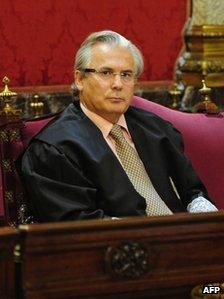Spain's Judge Baltasar Garzon convicted for wiretapping
- Published

Baltasar Garzon's case has polarised public opinion
Spain's Supreme Court has found the country's best-known judge, Baltasar Garzon, guilty of authorising illegal recordings of lawyers' conversations.
He has been banned from the legal profession for 11 years. The court said he could not appeal against the ruling.
Mr Garzon is best known for helping to secure the arrest of the former Chilean leader Augusto Pinochet in London.
He also faces two other charges, including exceeding his authority by investigating Franco-era crimes.
Correspondents say the ruling by the Supreme Court effectively ends Mr Garzon's career as a judge.
Mr Garzon's supporters say the cases against him are politically motivated and have been taking part in demonstrations outside the court during the trial.
'Loss of honours'
The conviction relates to the wire-tapping of conversations between prisoners and their lawyers ordered by Mr Garzon in 2009.
The detainees are accused of paying off politicians in return for government contracts.
Under Spanish law, wiretaps are only expressly permitted for terrorism laws and the legality if its use for other cases is more vague.
The written judgement imposes "the definitive loss of the duty and the honours that he bears" as a judge of Spain's National Court, and was passed unanimously by the seven Supreme Court judges.
It prohibits him from "obtaining during the duration of the sentence any employment or duty with judicial or governing functions within the judiciary".
"We shall carry on fighting, carry on appealing. We have a long road ahead, but I believe both he and I are more than strong enough," Mr Garzon's lawyer Javier Baena said after the sentence, according to Reuters.
The judge's decision in 2008 to investigate the disappearance of tens of thousands of people during the Franco era, including ordering the excavation of mass graves, provoked fierce criticism and anger.
The probe allegedly violates an amnesty on crimes committed during General Franco's rule.
Mr Garzon, however, argued that no amnesty can cover crimes against humanity.
That trial ended on Wednesday but the verdict is likely to take weeks.
The 56-year-old also faces a third charge, of allegedly dropping an investigation into the head of Spain's biggest bank, Santander, after receiving payments for a course sponsored by the bank. No date has been set for that trial.
- Published29 January 2012
- Published17 January 2012
- Published9 February 2012